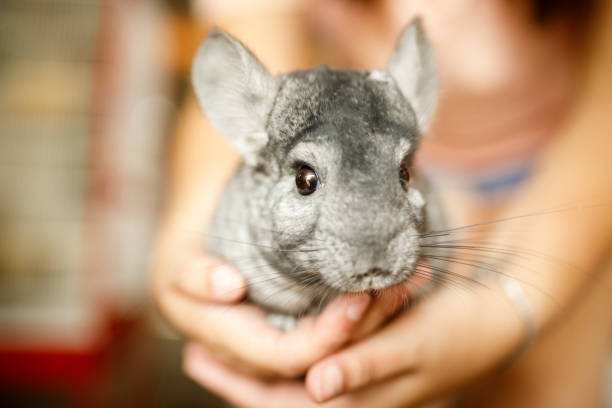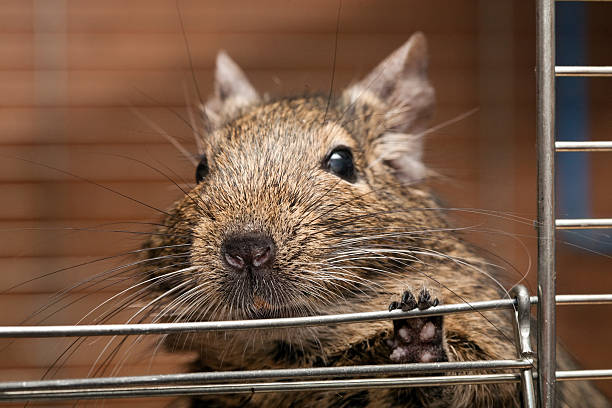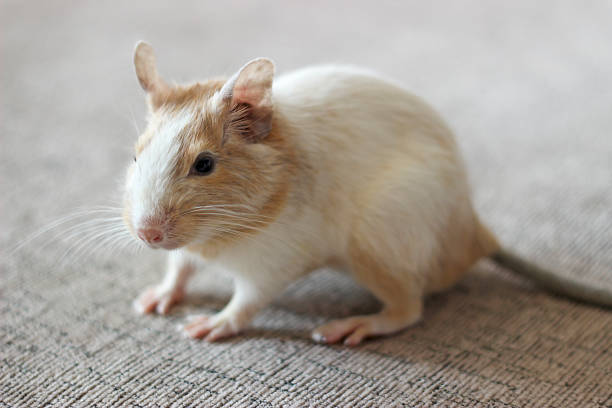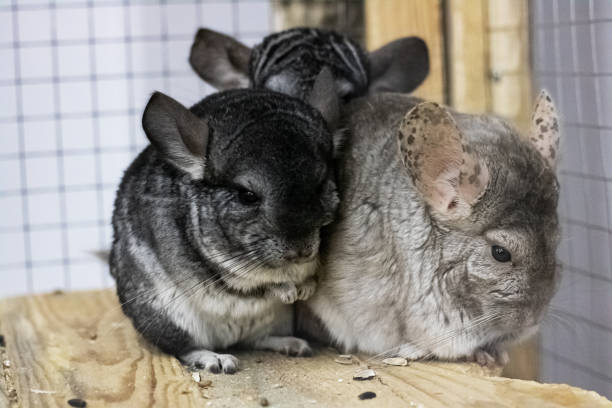Chinchilla Care 101: A Beginner’s Guide
This post contains affiliate links. This means I will make a commission at no extra cost to you should you click through and make a purchase. Read the full disclosure here.
Get started with chinchilla care 101! Our beginner’s guide covers everything you need to know about caring for these adorable pets.
Proper chinchilla care involves a spacious cage with exercise levels, a balanced diet of hay, pellets, and fresh water, supplemented by occasional treats. Grooming includes dust baths, nail trims, gentle brushing, and environmental enrichment through toys, exercise wheels, and regular cage rearrangements to prevent boredom.
We will answer all your questions and provide you with all the necessary information to make an informed decision. So let’s dive in and explore the world of Chinchilla care together!
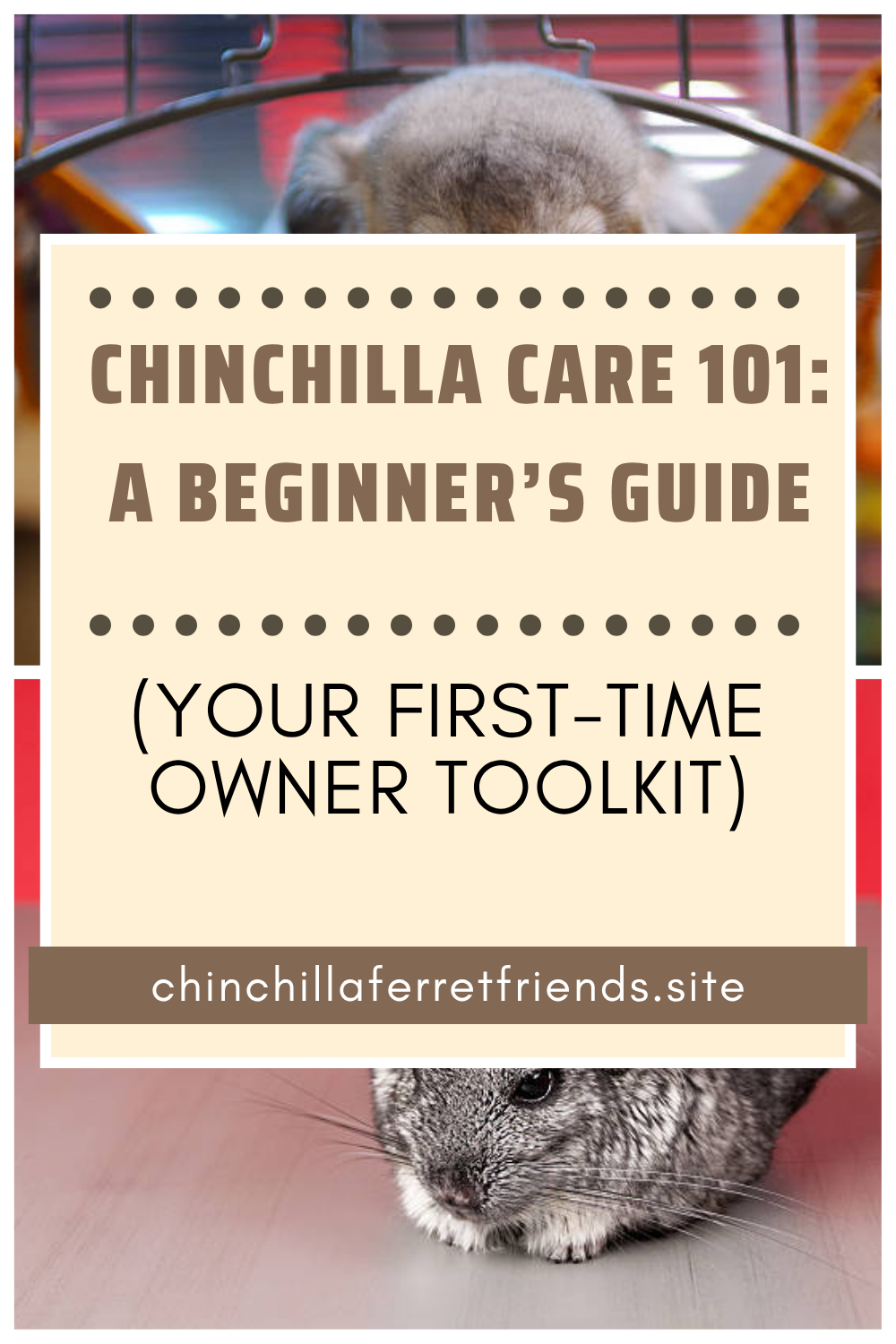
Getting to Know Chinchillas: An Overview
Chinchillas, originating from the Andes Mountains in South America, thrive in social herds and sport thick fur for warmth.Their hygiene regime includes dust baths, and as herbivores, they require a diet of hay, pellets, and fresh water. In the pet world for a long time, these rodents crave affection and are popular in pet stores.Their bathing routine involves volcanic ash, known as chinchilla bath dust, readily available in pet stores.
Origin of Chinchillas
Chinchillas, originating from the Andes Mountains in South America, have a remarkable history. Their dense fur not only keeps them warm but also acts as a form of a dust bath, ensuring their cleanliness and health.
In the wild, they mainly consume grass hay and orchard grass. It’s fascinating that chinchillas have a lifespan 10-20 years in captivity, a testament to their resilience. Sadly, these adorable rodents were nearly hunted to extinction for their fur, but now they thrive in new pet-loving homes.
Chinchilla Care: Considerations for Ownership
Chinchillas, as new pets, require proper care, including a chinchilla bath dust, chew toys, and a healthy diet. They need a spacious enclosure with proper ventilation, bedding, and affection.
Regular vet check-ups are essential for long-term wellness, and pet insurance can be beneficial. Chinchillas make good pets for older children with supervision. Keeping them away from direct sunlight and high humidity is crucial for their well-being.
Understanding a Chinchilla’s Needs
Chinchillas require a dust bath 2-4 times weekly for good condition. Exposure to cedar shavings or sunflower seeds can lead to health issues. Providing fresh water, clean litter, chew sticks, and timothy hay is crucial.
Chinchillas are susceptible to fur slip when stressed. Incorporate new pet, pet store, volcanic ash, and rodents into their habitat and affection to ensure their well-being.
Selecting the Perfect Chinchilla for You
Selecting the ideal chinchilla involves ensuring good health and condition, with clean, dry fur and no irritation or moisture. Check for healthy droppings, bright eyes, and a good appetite to guarantee a long time with your new pet.
Consider adopting a young chinchilla for a longer pet companion relationship. Remember, a healthy start ensures a wonderful journey with your new furry friend.
Related: Chinchilla Colors and Coats: Find the Perfect Chinchilla for You

Creating a Safe Haven: Housing Your Chinchilla
When housing your chinchilla, opt for a spacious, multi-level wire mesh cage with ramps, chew toys, and fleece bedding. Avoid cedar shavings and provide a dust bath house.
Maintain a cool, well-ventilated environment to prevent heat stroke. Ensure a safe haven for your new pet by creating an ideal habitat with volcanic ash for chinchilla bath dust and affectionate care.
Choosing the Best Cage
When selecting a cage for your chinchillas, ensure that the wire spacing is narrow enough to prevent escape. The minimum size for a pair or trio of chinchillas should be 90cm (L) x 60cm (D) x 120cm (H), providing ample space for exercise.
Look for cages with solid, flat surfaces to protect their sensitive feet and ensure proper ventilation for a healthy environment. Additionally, create a quiet, safe space within the enclosure for relaxation.
Essential Accessories for Your Chinchilla’s Cage
To ensure your chinchilla’s well-being, offer chew toys for dental health and amusement. Hydration and nutrition are vital, so include a water bottle and food bowl. Prioritize comfort with fleece bedding and nesting materials.
Maintain cleanliness by adding a litter box. Enhance their environment with platforms and ledges for climbing. These accessories will keep your chinchilla content and healthy within its enclosure.
Related:Create the Perfect Chinchilla Habitat: Cage, Accessories, and More
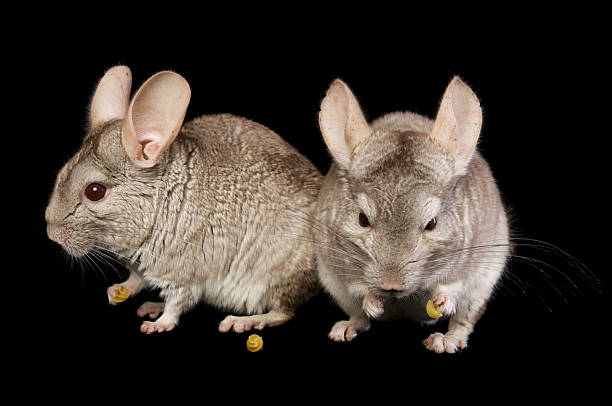
Nourishing Your Pet: Diet and Nutrition Tips for Chinchillas
Chinchillas thrive on a diet primarily of hay, such as timothy or orchard grass, supplemented with pellets specifically formulated for their nutritional needs. It’s important to remove any uneaten pellets within 24 hours and ensure a fresh water supply at all times.
While occasional treats like raisins are acceptable, lettuce should be avoided due to potential digestive issues. These dietary considerations are crucial for the overall health and wellness of your new pet.
Choosing the Right Foods
When considering the dietary needs of chinchillas, it’s essential to prioritize their nutritional requirements. Timothy hay plays a key role in promoting good digestion and dental health, making it a staple in their diet.
Specially formulated chinchilla food pellets are designed to provide the necessary nutrients, while alfalfa can be fed to young chinchillas due to its higher protein and calcium content.
However, it’s important to avoid sunflower seeds, as they can lead to health problems. Additionally, ensuring access to fresh, clean water is crucial for their overall well-being and vitality.
Tips for Maintaining a Balanced Diet
Chinchillas should have a diet rich in hay, pellets, and fresh water to stay healthy. High-calorie treats should be avoided to maintain a balanced diet.
Consider providing a small amount of fresh vegetables and herbs as part of their daily intake. Fresh water must always be available. A balanced diet of timothy hay, orchard grass, and alfalfa pellets is essential for their well-being.

Ensuring a Healthy Life: Wellness and Disease Prevention
Regular wellness check-ups are vital for your chinchilla’s health. Social interaction is key to their overall wellness. Providing regular dust baths ensures their physical well-being.
Monitoring food intake is crucial for their wellness. Ensuring your new pet’s long-term health involves understanding the significance of these practices.
Regular vet check-ups contribute to a chinchilla’s well-being and can be arranged through pet insurance. Creating a safe haven for your chinchilla with essential accessories from a pet store is necessary for their wellness.
Common Health Issues in Chinchillas
Chinchillas may suffer from heat stroke, a common health issue, and moisture in the enclosure can cause diarrhea and health problems.
Dental issues, including overgrown teeth, can lead to health problems, and stress may cause fur slip. Direct sunlight exposure can lead to eye irritation and health problems. Adding new pet chinchillas to your family means being aware of these potential health issues.
Regular Vet Check-ups and Their Importance
Maintaining a chinchilla’s good condition is crucial, and routine vet check-ups help in early detection of health problems. Regular vet check-ups are essential for preventing health issues and addressing any existing problems.
Additionally, veterinarians can offer advice on nutrition, wellness, and health issues specific to chinchillas. These check-ups ensure that new pet owners provide the best care for their chinchillas over the long time, contributing to their overall wellbeing and affection.
Related: Chinchilla Health: Common Health Issues and Preventive Care
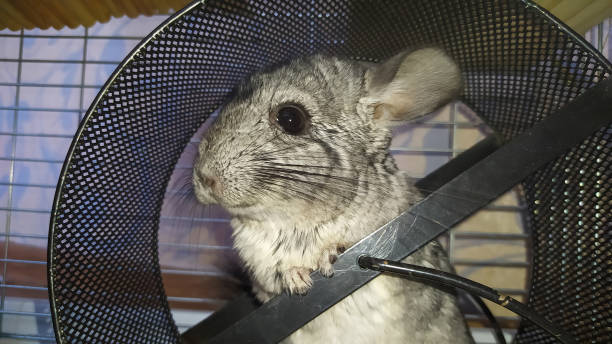
Keeping Active: Exercise and Play for Your Chinchilla
Chinchillas thrive on physical activities, needing chew toys and sticks for exercise and dental health. Ramps and platforms in their enclosure promote activity, while a spacious environment facilitates play.
Climbing and jumping are favorite pastimes, essential for chinchilla’s physical well-being. Daily playtime is crucial for their mental and physical health, ensuring a healthy, happy chinchilla.
Fun Activities for Your Chinchilla
Chinchillas love exploring toys, tunnels, and interactive play items. A dust bath is a fun and necessary activity, while enrichment activities like hiding treats provide mental stimulation.
Chew toys and sticks are great for entertainment, and providing fleece or soft bedding material offers comfort and fun. Incorporating these activities will keep your chinchilla engaged and happy.
Importance of Daily Play Time
Engaging chinchillas in daily playtime activities is crucial for maintaining their physical and emotional well-being. This time allows them to release excess energy, keeping them healthy and happy.
Interaction with pet parents during playtime fosters affection and a strong bond. Socializing with other chinchillas provides mental stimulation and enriches their lives. Quality playtime contributes to their overall wellness, ensuring that they lead a fulfilling and joyful life.
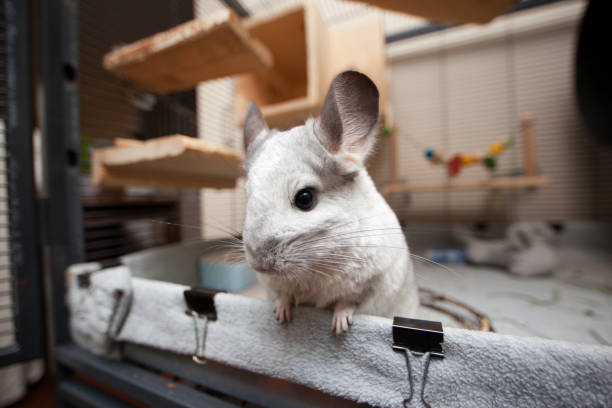
Pristine Fur: Grooming Your Chinchilla
Regular grooming practices, such as providing a chinchilla dust bath, are essential for helping chinchillas maintain clean fur. By grooming themselves through dust baths, chinchillas can ensure the cleanliness and health of their coats.
Grooming tools, like a chinchilla bath dust container, are vital for maintaining a chinchilla’s hygiene. Proper grooming practices play a crucial role in safeguarding a chinchilla’s overall wellness and affection.
Essential Grooming Tools
To ensure your chinchilla’s fur stays clean, a chinchilla dust bath is essential. Providing the right dust bath container or house is crucial. Additionally, soft brushes and combs are useful grooming tools. These grooming tools, including the chinchilla dust bath, play a vital role in maintaining your pet’s fur care and hygiene.
Maintaining a Healthy Coat: Tips and Tricks
Regular dust baths play a crucial role in preserving a chinchilla’s healthy coat. It’s important to avoid using cedar shavings, aspen, or pine as bedding, as these can impact the coat negatively.
Providing the right nutrition, including hay and pellets, contributes significantly to a chinchilla’s coat health. Regular dust baths are an essential grooming practice that aids in maintaining a lustrous coat. Additionally, ensuring a clean, moisture-free enclosure is vital for overall coat health and well-being.
Breeding in Chinchillas
During the breeding season from November to May, ensure proper care, nutrition, and a stress-free environment for pregnant chinchillas. Watch out for health issues like heat stroke and diarrhea, and provide a quiet, moisture-free, well-ventilated enclosure. Seek advice from a vet or experienced breeder for successful chinchilla breeding.
Housing and care for pregnant females
During pregnancy, it’s crucial to provide a cozy nest box with suitable bedding for the pregnant chinchilla. Limit handling and disturbances in the later stages of pregnancy to reduce stress.
Adjust the diet to meet increased nutritional needs. Regularly monitor her physical health, including weight gain, droppings, and urine. Creating a stress-free environment is essential to minimize the risk of pregnancy-related issues.
Breeding season for chinchillas
During the breeding season, which typically falls within the cooler months, it’s essential to wait until chinchillas are older before considering breeding to avoid potential health issues. Providing a balanced diet, proper grooming, and a clean living environment is crucial for successful breeding.
It’s important to monitor chinchillas for any signs of aggression or mating difficulties. Seeking guidance from a vet or experienced breeder can greatly contribute to a successful chinchilla breeding program.
Related: Dust Baths and Beyond: 6 Grooming Essentials for Chinchillas
Enjoying Your New Family Member: Embracing Chinchilla Ownership
Embracing chinchilla ownership means understanding their social nature—a new pet might appreciate a long time companion. Offering affection through chew toys, sticks, and volcanic ash bath dust enhances their well-being.
Providing fresh water, grass hay, and pellets from a pet store ensures a balanced diet. A spacious enclosure with proper ventilation and affectionate bedding is essential. Regular vet check-ups and pet insurance safeguard their health and happiness.
Understanding Your Chinchilla’s Behavior and Temperament
Chinchillas, being crepuscular, are most active at dawn and dusk. They require a long-term commitment, with a lifespan of 10-20 years. When stressed, chinchillas may engage in fur-slip, a defense mechanism.
To prevent health issues, maintain a humidity level of 50-60%. As herbivores, their essential diet includes hay, pellets, and fresh water. These factors play a crucial role in understanding your chinchilla’s behavior and temperament.
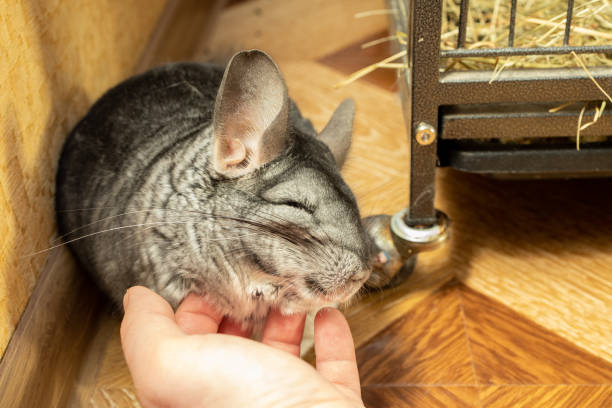
Do chinchillas make good pets?
Chinchillas do make good pets because they thrive with companionship, have a unique dust-bathing behavior to keep themselves clean, and can be affectionate. However, due to their sensitivity to heat and dental issues, chinchillas may not be suitable for young children.

Conclusion
In conclusion, chinchillas make wonderful pets for those who are committed to providing them with proper care and attention. From understanding their needs and selecting the perfect chinchilla to creating a safe and comfortable environment, nourishing them with a balanced diet, ensuring their wellness and preventing diseases, keeping them active through exercise and play, grooming their fur, and even considering breeding, there is a lot to learn about chinchilla care.
By embracing chinchilla ownership, you can enjoy the companionship of these adorable creatures and create a fulfilling bond. Remember, being a responsible chinchilla owner requires dedication, time, and effort, but the love and joy they bring to your life make it all worthwhile.

